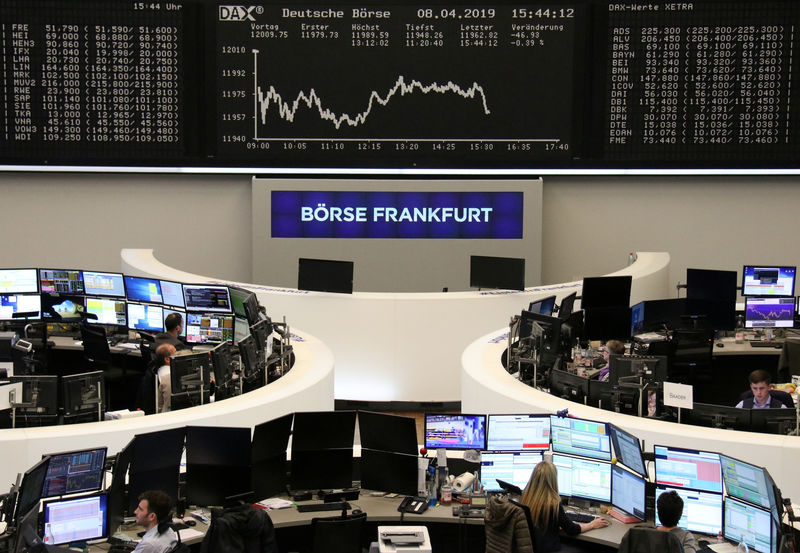By Marc Jones
LONDON (Reuters) - April's stocks rally risked running out of puff on Tuesday, as a U.S. threat to slap tariffs on hundreds of European goods and expectations of another chunky chop to the IMF’s global growth forecasts tested investors' stamina.
Asia had eked out a 8-month high overnight but Europe and Wall Street futures were both left flat after Donald Trump welcomed the World Trade Organisation's finding that Europe's subsides to planemaker Airbus had hurt the United States.
The U.S. "will now put tariffs on $11 Billion of EU products!" Trump tweeted. "The EU has taken advantage of the U.S. on trade for many years. It will soon stop!"
Airbus' shares dropped as much as 2.5 percent. Many of its key suppliers lost between 0.7 percent and 1.2 percent, though most of Europe's big bourses managed to keep their levels broadly flat.
Aberdeen Standard Investment's head of global multi-asset strategy Andrew Milligan said: "Signals like this just remind people that the strategic rivalry between the U.S. and other countries is serious and is not going to go away."
The day's other focus was set to be the International Monetary Fund's half-yearly forecasts, which are likely to reinforce the message that trade spats are contributing to slowing the global economy.
The Fund is expected to make quite a sizable cut to its growth number and Germany's 10-year bond yield stayed just below zero percent on bets interest rates are set to stay extremely low globally.
In the FX market, sterling nudged higher as UK Prime Minister Theresa May met Germany's Angela Merkel and France's Emmanuel Macron to ask for another Brexit delay.
The Australian and Canadian dollars, Norwegian crown and Russian rouble also rose as a surge in oil prices to five-month highs lifted most other commodity-linked currencies.
Saudi Arabia's state-owned oil firm also set the commodity market frothing on reports it had received more than $100 billion (£76.5 billion) of orders for its debut international bond, which was only supposed to raise $10 billion.
Brent, the global oil benchmark, rose as high as $71.34 a barrel, the highest since November, though by 1230 GMT it had eased back to $71.00. U.S. WTI crude was at $64.28, having earlier been at $64.77.
Oil prices - up more than 40 percent this year - have jumped on expectations that global supplies will tighten due to fighting in Libya, OPEC-led output cuts and U.S. sanctions against Iran and Venezuela.
"Concerns over the potential squeezing of supply in Libya following the escalation of violence there are adding fresh impetus," analysts at JBC Energy wrote.
PLANE SPEAKING
The flat start that looked likely for Wall Street came as focus shifted to the start of the first-quarter earnings season later this week, and as European officials warned that if Trump targeted Airbus, they would hit Boeing (NYSE:BA).
In emerging markets, eyebrows were raised too as Kazakhstan said it was bringing forward presidential elections due to be held next year to June. Former President Nursultan Nazarbayev stepped down last month after three decades in power.
The additional surprise on Tuesday was that his daughter Dariga Nazarbayeva has no plans to run in the June vote, according to her aide.
That leaves interim president Kassym-Jomart Tokayev in the driving seat, but may fan speculation of a power struggle.

At the same time, "it will reduce the uncertainty that was otherwise going to sit there for the next 18 months," said Renaissance Capital's head of macro-strategy Charles Robertson.